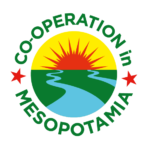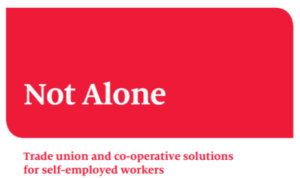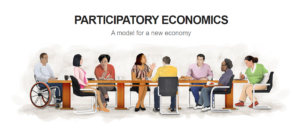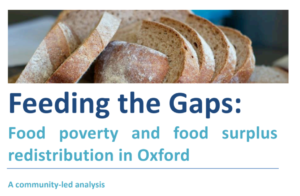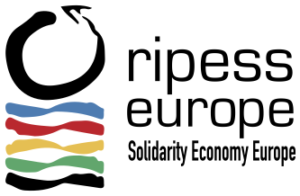Our work
Our vision is a just and sustainable world, and we believe that to create that, we need a transformation away from capitalism towards an economy that embodies environmental and social justice, diversity and pluralism, co-operation, self-management and ecological sustainability – a solidarity economy.
We were set up to support the growth of the solidarity economy movement in the UK, and to connect it with the wider global movement.
We undertake projects and activity in the following areas:
Mapping the Solidarity Economy
We’re undertaking significant work to map the diverse initiatives, activity and movements that make up the Solidarity Economy Movement.
The UK has thriving networks of solidarity economy initiatives, and we believe that by mapping these diverse networks, the movement as a whole will be stronger. We also believe that the easier it is for people to find initiatives within it, the easier it will be to understand it, to support it, and for those actively involved in it to collaborate.
Our mapping work also helps to inform and educate people about the solidarity economy, it helps us to champion the activity within it and to create a thriving and supportive network.
We are using a particular type of technology called Linked Open Data to develop an infrastructure that will allow us to connect and share data about the solidarity economy. This technology firmly aligns with the values of the co-operative movement and the wider solidarity economy.
We are currently undertaking two pilot projects to map geographic areas using this technology.
Mapping Oxford’s Solidarity Economy
Oxford has a whole host of organisations, projects and people working to create a just and sustainable city. From swap shops and childcare circles to housing co-ops and community farms, we’ve got a thriving network of initiatives meeting the needs of our communities in ways that put people, and our environment, first.
Around the world, activity like this is known as the solidarity economy. In many cities and countries – from New York City to Barcelona, and from Mali to Brazil – solidarity economy initiatives play a fundamental role in people’s lives.
In New York City, a group of people came together to create a map of their solidarity economy, and this map has helped to make their city’s communities more connected, their projects and initiatives stronger, and has helped more people to be able to access the products and services they need in ethical and sustainable ways.
We’re exploring whether creating a map in Oxford is similarly helpful for our communities.
Mapping in Newcastle & Gateshead
We are collaborating with the NewBridge Project on a process to map the different projects, initiatives, co-operatives and individuals within Newcastle and Gateshead who are actively engaging in environmental and social justice. The aims of the project are to:
- Help us recognise and celebrate what is already happening in the region;
- identify what’s missing;
- enable collaboration;
- create a stronger voice and more significant impact locally.
It will also be a starting point to plan future artistic and community-led action in response to current social and ecological issues.
The NewBridge Project is an artist-led community hub that supports the development of artists and curators. Our collaboration with them is part of a broader piece of work by the NewBridge Project which uses Professor Jem Bendell’s Deep Adaptation approach to explore how current social, political, civic, and economic issues can be understood in relation to climate change. Click here to find out more about Deep Adaptation.
As part of this collaboration we have hosted a MAPJAM event in Gateshead in October, and we’ll be creating a digital map using our Linked Open Data technology framework.
We will be undertaking this exploratory work from September 2018.
Furthering Education on the Solidarity Economy Movement
One of our most significant pieces of education work is our Co-operation in Mesopotamia project.
Co-operation in Mesopotamia
Co-operation in Mesopotamia is one of our major, and most successful projects. Its aim is to foster international solidarity and further education about the largely women-driven co-operative economy that is growing, despite ongoing war, in the Autonomous Administration of North and East Syria, commonly known as Rojava.
The project began with a research, translation and education focus, and over the past 3 years we’ve shared over 300 articles on our website, run around 30 workshops all over the UK, and developed strong relationships with many partners, including women’s economic bodies in Rojava, as well as co-ops and co-op bodies in the UK. We’ve received overwhelmingly positive engagement with the project, and the UK co-op movement is now much better informed about its counterpart in Rojava.
Research
Undertaking and supporting research that supports the growth of alternative economic systems to Capitalism is a core part of our work. Take a look at some of the research projects we’ve supported so far:
Not Alone research project
More than 15% of the workforce is self-employed (some 4.6 million people) and this percentage is set to increase. With the rise of freelancing comes a fundamental shift in the nature of work. Some, driven by the lure of freedom, are choosing to be self-employed; others are going freelance out of necessity. Changes to the labour market mean that zero hours contracts, part-time work and ‘portfolio’ careers are becoming more and more the norm.
We have supported the second phase of the Not Alone: Trade Union & Co-operative Solutions for Self-Employed Workers research project to look at recent trends in self-employment, both here in the UK and across the world, and to consider how the co-operative and trade union movements can serve and protect the growing precariat. The first report was published in 2016, and the second in 2017.
The project was being undertaken by Co-operatives UK in partnership with the Wales Co-operative Centre and Unity Trust Bank.
Participatory Planning Simulation Project
We’ve been supporting a team of researchers at Portland University, directed by Prof Robin Hahnel, to develop digital simulations to model the Participatory Planning economic system.
Participatory Economics is a model for a new economy based on democracy, justice and ecological sustainability proposed as an alternative to our current economic system. We were the first organisation to support this work, to model how the system could work, and members of the team were also active in the research and provided some feedback to the research team.
Feeding the Gaps Report
We supported an Oxford-based research project delivered by Good Food Oxford to explore the problem of food poverty and food waste in the city.
The research team spoke to staff and volunteers working in existing food services and community groups, collecting their stories relating to food waste and food poverty, and were able to piece together the picture for Oxford. Feeding the Gaps report was published at the end of September 2014.
Principle Six Plus Grants
The Principle Six Plus Fund was a one-off funding pot of £10,000 launched in 2015. Its aim was to support existing or new research or education projects that further co-operation between co-operatives. Applications to the fund were assessed by our network members and grants made accordingly. Through the fund we supported the following initiatives:
SolidFund
SolidFund is a worker co-op solidarity fund established to help build a strong, growing and self-reliant network of successful workers’ co-operatives. It is a permanent common fund, paid for by members who can subscribe for as little as £1 per week.
National Body of Student Housing Co-ops Report
The fund provided support for Students for Cooperation to carry out the feasibility scoping and create a 48 page report showing the possibility of creating a National Body of Student Housing Co-operatives.
Young Co-operators Network
We supported AltGen to set up the Young Co-operators Network. AltGen is an organisation that helps young people set up workers’ co-operatives as an alternative to competitive, precarious and low-wage career paths.



